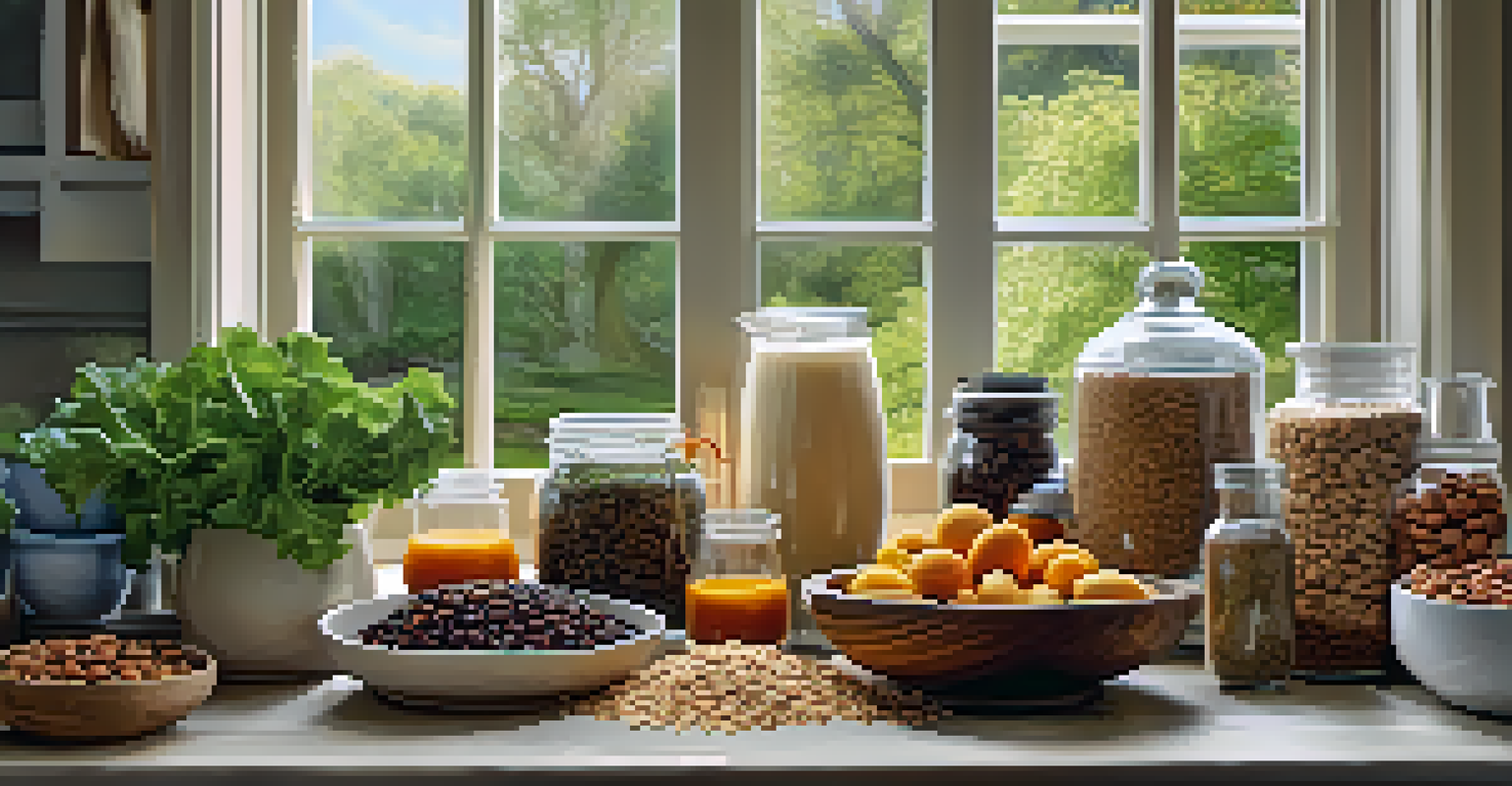Nutrition and Sleep: Foods That Promote Better Rest

The Connection Between Nutrition and Sleep Quality
Nutrition and sleep are closely intertwined, and what you eat can significantly affect your ability to rest well at night. Foods rich in certain nutrients can promote relaxation and support the body's natural sleep cycles. Understanding this connection can help you make better dietary choices for improved sleep quality.
Let food be thy medicine and medicine be thy food.
For instance, a diet high in refined sugars and unhealthy fats can lead to disrupted sleep patterns, leaving you feeling groggy in the morning. Conversely, incorporating whole foods and specific nutrients can create the optimal environment for sleep. It’s fascinating to realize that your dinner plate can play a role in how well you sleep.
By focusing on nutrient-dense foods, you not only enhance your overall health but also set the stage for a restful night. Let's explore some key foods that can promote better sleep and help you wake up refreshed.
Tryptophan-Rich Foods for Sleep Enhancement
Tryptophan is an essential amino acid that plays a crucial role in the production of serotonin and melatonin—two hormones that regulate sleep. Foods rich in tryptophan can help your body naturally increase these hormones, making it easier to drift off into slumber. Turkey, for example, is famously known for its tryptophan content, often blamed for post-Thanksgiving drowsiness.

Other great sources include chicken, fish, nuts, and seeds, which can easily be incorporated into your meals. A warm bowl of oatmeal or a banana before bed can also provide a dose of tryptophan, promoting relaxation. So, the next time you're preparing dinner, consider adding a tryptophan-rich food to your plate.
Nutrition Impacts Sleep Quality
What you eat plays a crucial role in your ability to get restful sleep, with certain foods promoting relaxation and supporting sleep cycles.
By making these small changes, you could enhance your body's ability to fall asleep naturally and enjoy a deeper, more restorative rest.
Magnesium: The Sleep Mineral You Need
Magnesium is often referred to as the 'sleep mineral' because of its calming properties. This essential mineral helps to regulate neurotransmitters, which send signals throughout the nervous system and brain, promoting relaxation. Foods high in magnesium, such as leafy greens, nuts, seeds, and whole grains, can play a significant role in improving sleep quality.
Sleep is the best meditation.
Incorporating magnesium-rich foods into your diet can help reduce insomnia and encourage deeper sleep. For example, a simple spinach salad topped with pumpkin seeds can be both delicious and beneficial for your sleep. Additionally, a warm cup of chamomile tea, known for its calming effects, often contains magnesium, making it a perfect bedtime beverage.
Remember, a magnesium deficiency can lead to sleep disturbances, so ensuring you get enough of this mineral is key to restful nights.
Carbohydrates and Sleep: The Right Type Matters
While we often think of carbohydrates as a source of energy, choosing the right types can actually aid in sleep. Complex carbohydrates, such as whole grains and legumes, can increase the availability of tryptophan in the brain, making it easier to fall asleep. This is in stark contrast to simple sugars, which can spike energy levels and disrupt sleep.
For example, a bowl of quinoa or brown rice paired with vegetables and a protein source can create a balanced meal that promotes better sleep. On the other hand, indulging in sugary snacks before bed might lead to restless nights. It’s all about making conscious choices that benefit your sleep hygiene.
Tryptophan Enhances Sleep
Foods rich in tryptophan, like turkey and nuts, help boost the production of sleep-regulating hormones, making it easier to fall asleep.
By opting for complex carbohydrates in your evening meals, you can enhance your body's ability to relax and prepare for sleep.
Foods to Avoid for Better Sleep
Just as there are foods that can promote better sleep, there are also those you should steer clear of, particularly before bedtime. Caffeinated beverages, like coffee and certain teas, can keep you awake and alert long into the night. Additionally, spicy foods may cause heartburn or indigestion, disrupting your ability to sleep comfortably.
Alcohol, while it may initially make you feel drowsy, can actually interfere with the sleep cycle, leading to fragmented rest. Being mindful of these foods and planning your meals accordingly can create a more conducive environment for sleep. For instance, swapping your evening coffee for herbal tea can make a significant difference.
Ultimately, being aware of what impacts your sleep can empower you to make better choices and enjoy a more restful night.
The Role of Hydration in Sleep Quality
Hydration is vital for overall health, but it also plays a role in sleep quality. Being well-hydrated can help regulate body temperature and aid in digestion, both of which are important for a good night’s sleep. However, it’s important to strike a balance; drinking too much water right before bed can lead to frequent trips to the bathroom, disrupting your rest.
Aim to hydrate throughout the day, and consider limiting your fluid intake in the hours leading up to bedtime. Foods with high water content, like cucumbers and watermelon, can contribute to your hydration without the need to drink excessive amounts of water. Staying hydrated can also help alleviate issues like dry throat or nasal passages that can interfere with sleep.
Avoid Foods That Disrupt Sleep
Caffeinated drinks, spicy foods, and alcohol can interfere with sleep, so it’s important to choose your evening snacks wisely.
By managing your hydration wisely, you can create an ideal setting for relaxation and rest.
Creating a Sleep-Friendly Meal Plan
Crafting a meal plan that supports better sleep doesn’t have to be complicated. Start by incorporating a variety of foods rich in magnesium, tryptophan, and complex carbohydrates into your daily diet. Planning your meals around these nutrients can help create a balanced approach to nutrition that promotes rest.
For example, consider a dinner menu that features grilled salmon, quinoa, and steamed broccoli, followed by a small bowl of cherries or a banana. These choices not only provide essential nutrients but also signal to your body that it’s time to wind down. Additionally, establishing a regular eating schedule can help regulate your body's internal clock, further enhancing your sleep routine.

By taking the time to create a sleep-friendly meal plan, you empower yourself to make dietary choices that foster better rest.